What’s Up?
Sebastian Inlet is on fire. On Wednesday morning, Bob Eastman and I enjoyed a huge feeding spree with the pelicans, terns, and Ospreys diving on bait for hours. On Thursday morning, the action shifted to the end of the (soon-to-be-closed-for-nine-months) North Jetty. The added bonus was a juvenile Sabine’s Gull, insanely rare for Florida. I had seen one before when I was living on Staten Island. I was birding the harbor at Great Kills Park the day after Thanksgiving, probably around 1980.
Today is Friday 8 November 2024. David Pugsley and wife Michelle arrived at the AiBnB and will be joining us for a morning session at Sebastian Inlet. We will be leaving at 5:30am. Wherever you are and whatever you are doing, we hope that you too choose to have a wondrous day.
Please remember to use the B&H links that are found on most blog pages and to use the BIRDSASART discount code at checkout when purchasing your new gear from Bedfords to get 3% back on your credit card and enjoy free second-day air FedEx. Please, also, consider joining a BAA IPT. You will be amazed at how much you will learn!
If an item — a Delkin flash card, or a tripod head — for example, that is available from B&H and/or Bedfords, is also available in the BAA Online Store, it would be great, and greatly appreciated, if you would opt to purchase from us. We will match any price. Please remember also to use my B&H affiliate links or to earn 3% cash back at Bedfords by using the BIRDSASART discount code at checkout for your major gear purchases. Doing either often earns you free guides and/or discounts. And always earns my great appreciation.
Supporting My Efforts Here
If you enjoy and learn from the blog, are all set for gear, or live overseas, consider leaving a BAA Blog Thank You Gift here.
If you enjoy and learn from the blog, please consider using one of my affiliate links when purchasing new gear. It will never cost you a single penny. To support my effort here, please order from B&H by beginning your search here. Or, click here, to order from Bedfords and enter the discount code BIRDSASART at checkout to receive 3% cash back to your credit card and enjoy free Second-Day Air Fed-Ex shipping. It is always best to write for advice via e-mail.
In many cases, I can help you save some serious dollars. And/or prevent you from purchasing the wrong gear from the wrong shop.
The Osprey and the Thieving Brown Pelican/A Fabulous Story-telling Photo Sequence by My Friend, Bob Eastman
Kudos to friend Bob Eastman for being a great student, getting the shutter speed and the exposure right, and blasting away when he recognized a great situation. The 150+ frame sequence was created in 12 seconds. That meant that he was off the shutter button about half the time, taking care to assure accurate focus. Note that Images 5,6,7, and 8 were all created within a single second. And that Image 9, 10, and 11 were created in the next single second.
It just shows to go you what someone with “just” an a-1 and the Sony 200-600 can accomplish in short order with their camera set up properly and a bit of competent instruction. All raw conversions and image optimizations by Arthur Morris/BIRDS AS ART.
Bob is currently using my CAMST202.DAT setting on his a-1 with the firmware updated to 2.02. As I recommend, he has made a few changes to my settings to best reflect his personal shooting style.
It’s Safe to go in the Water Now
Sony a-1 Firmware Update Update
Last spring, Sony announced firmware update v2.00 for the a-1, its flagship camera body. In short order the firmware story became an embarrassing fiasco. Over time, the announced v2.01 that caused terrible problems with the camera was used with the hugely popular 200-600 G lens. After some time, they released v2.02. About six weeks ago, with some trepidation, I purchased a used a-1 and updated it to v.2.01, and then to 2.02. I am happy to report that it is now possible to go back into the water.
The last update, v2.02, offers some great stuff for bird photographers.
v.2.02 Benefits
Battery life with 2.02 is fine. There are no issues with the 200-600 G lens. Bird Face-Eye AF is significantly improved. Formatting a card takes about two seconds as compared to 10 seconds or more with previous firmware versions. But the very best news is a brand new feature called Focus Recall. Huge thanks to Arash Hazeghi for pointing it out to me as we worked on an update to the Sony a-1 (a9 iii) flight guide. I took what he taught me about programming Preset Focus/Zoom to a single button for flight photography and turned it into what will surely turn out to be a huge game-changer for general bird photography.
I call it “double button focus recall.” I programmed two easy-to-reach (previously unassigned) buttons to PRESET Focus Distance. I can then register a close focusing distance to one button and a far focusing distance to the other. A tap of either button instantly brings me to either as needed.
Here is a practical, real life example. I am walking out on the pier. There are some very tame Turkey Vultures and a Limpkin perched on the railing. As I slowly approach the birds, I focus on the nearest one and then press and hold the near-focus button. Th camera registers the focus distance my current close focus distance. I might or might not create a few images. Before continuing my approach, however, I take a moment to focus on the end of the pier and this time I press and hold the far focus button. That becomes my far focus distance. Then I tap the close focus button for the birds on the railings and go to work.
I glance up and see an Osprey carrying a large Crappie in its talons flying over the end of the pier. I tap the AEL button to get to my pre-registered far focusing distance. The AF system will have a relatively easy time of seeing the subject. And once the bird is framed, initial focusing acquisition will be virtually instantaneous. Had the AF system been left at the close focusing distance (while working the birds on the pier railing), there is a good chance that the system would have been temporarily blind when I attempted to acquire focus on the Osprey in flight.
Understand that neither the close nor the far focusing distances need to be anywhere near precise. As long as the AF system is in the general neighborhood (as far as focusing distance is concerned), it will not struggle to acquire focus. Once the Osprey flies by, Artie simply taps the AF-On button to instantly get back to the approximate focusing distance for the birds on the railing.
Yesterday I sent the SONY Alpha a1 Set-up and Info Notes e-Mail J (23 OCT 2024) Firmware Update Update item to the entire group; it began like this:
Dear a1 Gang,
I hope that all of you are well, having fun, and making some great images. Big time thanks and congrats to the twenty folks in the group who have gotten my v2.02 settings onto their a-1 bodies. Many of them helped by letting me know of typos and other errors in the two instructional e-mails. After ten full days or working every morning with my v2.02 Firmware a-1, the 600mm f/4, and the 300mm f/2.8 (each with either TC), I can wholeheartedly recommend that most everyone with an a-1 would be best to update to Firmware v2.02.
If you are a member of the a-1 group and have not received e-Mail J, please e-mail me with your current and correct e-mail address 🙂
a-1 Group members can receive the two e-mails by sending a PayPal for $50.00 (with the words a-1 v2.021/v2.02 Firmware updates in the Subject line) to birdsasart@verizon.net or by calling the office at 863-692-0906 with a credit card to pay the $50.00.
If you are not a member of my a-1 group and would like to update your camera body and get all of my current setting on it, you will need to either send a PayPal for $125.00 (with the words a-1 v2.021/v2.02 Firmware updates in the Subject line) to birdsasart@verizon.net or call Jim at 863-692-0906 with a credit card to pay the $125.00.
All of the images in today’s blog post were created with my v2.02 CAMST202.DAT settings on Bob’s a-i mirrorless camera body.
|
|
|
This image was created on 3 November by Bob Eastman on the very extended Sebastian Inlet Ospreys and More IPT. He used the hand held Sony FE 200-600mm f/5.6-6.3 G OSS lens (at 600mm) and The One, the Sony Alpha 1 Mirrorless digital camera. ) The exposure was determined using Zebra technology with ISO on the Thumb Dial. ISO 640. 1/4000 second at f/6.3 (wide-open) in Manual Mode. AWB at 8:48:37am on a sunny morning. RawDigger showed the exposure to be dead solid perfect. Tracking: Set (S) AF-C with Bird Face/Eye Detection performed perfectly. Be sure to click on the image to enjoy a high-res version. Image #1: Osprey mantling prey, in this case, a menhaden
|
Dive and Capture
When an Osprey dives and secures a fish in its talons, it will often mantle its prey, protecting its catch from other Ospreys, gulls, and pelicans. In addition, I believe that they are taking a brief rest before attempting to lift the fish out of the water
|
|
|
This image was created on 3 November by Bob Eastman on the very extended Sebastian Inlet Ospreys and More IPT. He used the hand held Sony FE 200-600mm f/5.6-6.3 G OSS lens (at 600mm) and The One, the Sony Alpha 1 Mirrorless digital camera. ) The exposure was determined using Zebra technology with ISO on the Thumb Dial. ISO 640. 1/4000 second at f/6.3 (wide-open) in Manual Mode. AWB at 8:48:40am on a sunny morning. RawDigger showed the exposure to be dead solid perfect. Tracking: Set (S) AF-C with Bird Face/Eye Detection performed perfectly. Be sure to click on the image to enjoy a high-res version. Image #2: Osprey lifting fish out of the water
|
Liftoff
Note that the bird has turned to face into the east wind; that to provide additional lift so to successfully get out of the water with the fish.
|
|
|
This image was created on 3 November by Bob Eastman on the very extended Sebastian Inlet Ospreys and More IPT. He used the hand held Sony FE 200-600mm f/5.6-6.3 G OSS lens (at 600mm) and The One, the Sony Alpha 1 Mirrorless digital camera. ) The exposure was determined using Zebra technology with ISO on the Thumb Dial. ISO 640. 1/4000 second at f/6.3 (wide-open) in Manual Mode. AWB at 8:48:40am on a sunny morning. RawDigger showed the exposure to be dead solid perfect. Tracking: Set (S) AF-C with Bird Face/Eye Detection performed perfectly. Be sure to click on the image to enjoy a high-res version. Image #3: Osprey struggling to lift fish out of water
|
The Fish is Winning
As the Osprey had trouble getting airborne despite the frantic flapping of its wings, it settled on the water again, in part to rest. The fish is struggling to escape and is pulling the Osprey down.
|
|
|
This image was created on 3 November by Bob Eastman on the very extended Sebastian Inlet Ospreys and More IPT. He used the hand held Sony FE 200-600mm f/5.6-6.3 G OSS lens (at 600mm) and The One, the Sony Alpha 1 Mirrorless digital camera. ) The exposure was determined using Zebra technology with ISO on the Thumb Dial. ISO 640. 1/4000 second at f/6.3 (wide-open) in Manual Mode. AWB at 8:48:44am on a sunny morning. RawDigger showed the exposure to be dead solid perfect. Tracking: Set (S) AF-C with Bird Face/Eye Detection performed perfectly. Be sure to click on the image to enjoy a high-res version. Image #4: Osprey taking a break
|
Rest Period
Nearly exhausted, the Osprey is taking a break to rest its weary wing muscles. Note that the Osprey’s tail is spread to increase its buoyancy. That too is getting very tired.
|
|
|
This image was created on 3 November by Bob Eastman on the very extended Sebastian Inlet Ospreys and More IPT. He used the hand held Sony FE 200-600mm f/5.6-6.3 G OSS lens (at 600mm) and The One, the Sony Alpha 1 Mirrorless digital camera. ) The exposure was determined using Zebra technology with ISO on the Thumb Dial. ISO 640. 1/4000 second at f/6.3 (wide-open) in Manual Mode. AWB at 8:48:47am on a sunny morning. RawDigger showed the exposure to be dead solid perfect. Tracking: Set (S) AF-C with Bird Face/Eye Detection performed perfectly. Be sure to click on the image to enjoy a high-res version. Image #5: Osprey taking flight with menhaden in its talons
|
Back in the Air
After its rest, the Osprey again was able to take flight with its catch, a Yellow-tailed Menhaden. Bob thought that the bird was in the clear.
|
|
|
This image was created on 3 November by Bob Eastman on the very extended Sebastian Inlet Ospreys and More IPT. He used the hand held Sony FE 200-600mm f/5.6-6.3 G OSS lens (at 600mm) and The One, the Sony Alpha 1 Mirrorless digital camera. ) The exposure was determined using Zebra technology with ISO on the Thumb Dial. ISO 640. 1/4000 second at f/6.3 (wide-open) in Manual Mode. AWB at 8:48:47am on a sunny morning. RawDigger showed the exposure to be dead solid perfect. Tracking: Set (S) AF-C with Bird Face/Eye Detection performed perfectly. Be sure to click on the image to enjoy a high-res version. Image #6: Brown Pelican joins the fray
|
Trouble in Paradise
Suddenly, an adult Brown Pelican swooped in from the north with its eyes on the prize, the Osprey’s catch. Kudos to Bob for keeping the shutter button down. “When unexpected action happens, press the shutter button and keep it pressed until the action is over.
|
|
|
This image was created on 3 November by Bob Eastman on the very extended Sebastian Inlet Ospreys and More IPT. He used the hand held Sony FE 200-600mm f/5.6-6.3 G OSS lens (at 600mm) and The One, the Sony Alpha 1 Mirrorless digital camera. ) The exposure was determined using Zebra technology with ISO on the Thumb Dial. ISO 640. 1/4000 second at f/6.3 (wide-open) in Manual Mode. AWB at 8:48:47am on a sunny morning. RawDigger showed the exposure to be dead solid perfect. Tracking: Set (S) AF-C with Bird Face/Eye Detection performed perfectly. Be sure to click on the image to enjoy a high-res version. Image #7: The moment of truth!
|
The Moment of Truth
I opted to optimize all of Bob’s fabulous images from this series as a partial thanks for flopping the door on my clothes dryer and for doing 100% of the driving. After processing the other ten photos here on Tuesday, I decided to add this one on Thursday. The problem was that the right side of the Osprey’s face was shaded by its right wing and what we can see of the pelican’s bill and bill pouch were totally in the dark, being shaded by the Osprey. It is possible that I might be considered for a Nobel Prize for Image Processing for this one. The optimized image is, of course, another huge a-1 crop. Kudos to Bob and to Sony. And me 🙂
|
|
|
This image was created on 3 November by Bob Eastman on the very extended Sebastian Inlet Ospreys and More IPT. He used the hand held Sony FE 200-600mm f/5.6-6.3 G OSS lens (at 600mm) and The One, the Sony Alpha 1 Mirrorless digital camera. ) The exposure was determined using Zebra technology with ISO on the Thumb Dial. ISO 640. 1/4000 second at f/6.3 (wide-open) in Manual Mode. AWB at 8:48:47am on a sunny morning. RawDigger showed the exposure to be dead solid perfect. Tracking: Set (S) AF-C with Bird Face/Eye Detection performed perfectly. Be sure to click on the image to enjoy a high-res version. Image #8: Brown Pelican first grabs the fish
|
The Bunker in the Pelican’s Bill
Mossbunker, or bunker, is a term for all species of Menhaden. In Image #7, the attacking pelican is just getting its bill onto the fish.
|
|
|
This image was created on 3 November by Bob Eastman on the very extended Sebastian Inlet Ospreys and More IPT. He used the hand held Sony FE 200-600mm f/5.6-6.3 G OSS lens (at 600mm) and The One, the Sony Alpha 1 Mirrorless digital camera. ) The exposure was determined using Zebra technology with ISO on the Thumb Dial. ISO 640. 1/4000 second at f/6.3 (wide-open) in Manual Mode. AWB at 8:48:48am on a sunny morning. RawDigger showed the exposure to be dead solid perfect. Tracking: Set (S) AF-C with Bird Face/Eye Detection performed perfectly. Be sure to click on the image to enjoy a high-res version. Image #9: Brown Pelican has the fish!
|
The Pelican is Winning
At this point, the pelican has the fish firmly in its bill. And it looks as if the Osprey has released its grip on the fish by relaxing its talons.
|
|
#9A: Tight Crop of Brown Pelican Brown Pelican has the fish! image. |
Sony a-1 Crop-ability!
As you have been seeing here for several years, with 51 million pixels, sharp, properly exposed-to-the-right Sony a-1 raw files can stand up well to huge crops. What amazes me here is the width of the tip of the pelicans bill when the pouch is expanded. It looks as wide as the prow of a battleship!
|
|
|
This image was created on 3 November by Bob Eastman on the very extended Sebastian Inlet Ospreys and More IPT. He used the hand held Sony FE 200-600mm f/5.6-6.3 G OSS lens (at 600mm) and The One, the Sony Alpha 1 Mirrorless digital camera. ) The exposure was determined using Zebra technology with ISO on the Thumb Dial. ISO 640. 1/4000 second at f/6.3 (wide-open) in Manual Mode. AWB at 8:48:48am on a sunny morning. RawDigger showed the exposure to be dead solid perfect. Tracking: Set (S) AF-C with Bird Face/Eye Detection performed perfectly. Be sure to click on the image to enjoy a high-res version. Image #10: The Osprey leaving the scene
|
Over and Done
The pelican has the fish cross-wise firmly in its bill. And Osprey has given up.
|
|
|
This image was created on 3 November by Bob Eastman on the very extended Sebastian Inlet Ospreys and More IPT. He used the hand held Sony FE 200-600mm f/5.6-6.3 G OSS lens (at 600mm) and The One, the Sony Alpha 1 Mirrorless digital camera. ) The exposure was determined using Zebra technology with ISO on the Thumb Dial. ISO 640. 1/4000 second at f/6.3 (wide-open) in Manual Mode. AWB at 8:48:48am on a sunny morning. RawDigger showed the exposure to be dead solid perfect. Tracking: Set (S) AF-C with Bird Face/Eye Detection performed perfectly. Be sure to click on the image to enjoy a high-res version. Image #11: The Brown Pelican eating the fish
|
Time to Go Fishing. Again
The Osprey is off to look for another bunker while the pelican is busy swallowing its meal.
Typos
With all blog posts, feel free to e-mail or to leave a comment regarding any typos or errors.

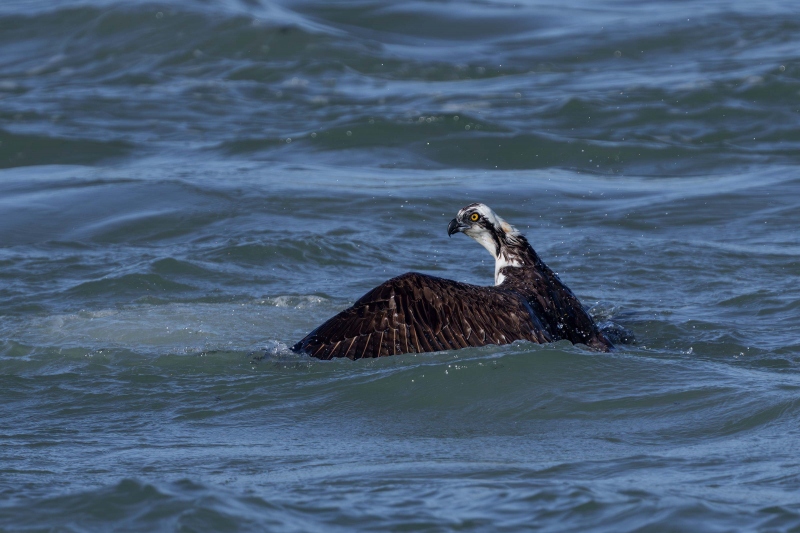
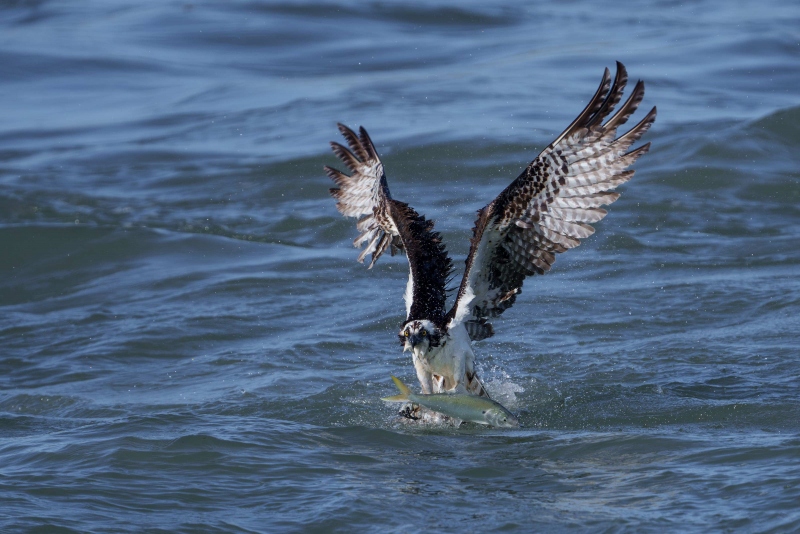
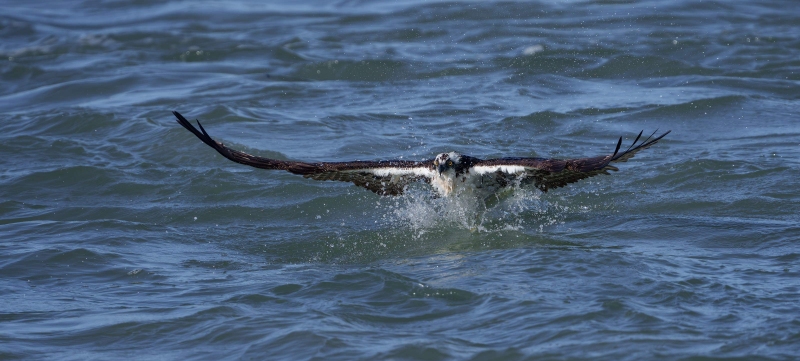
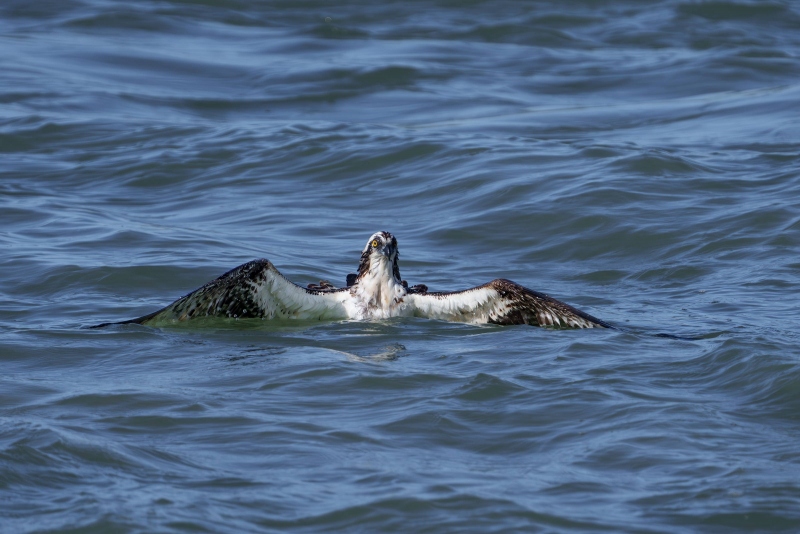
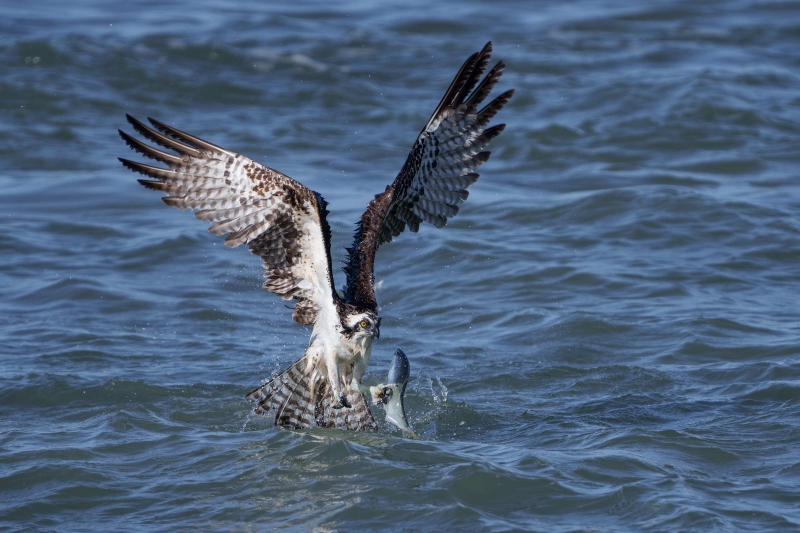
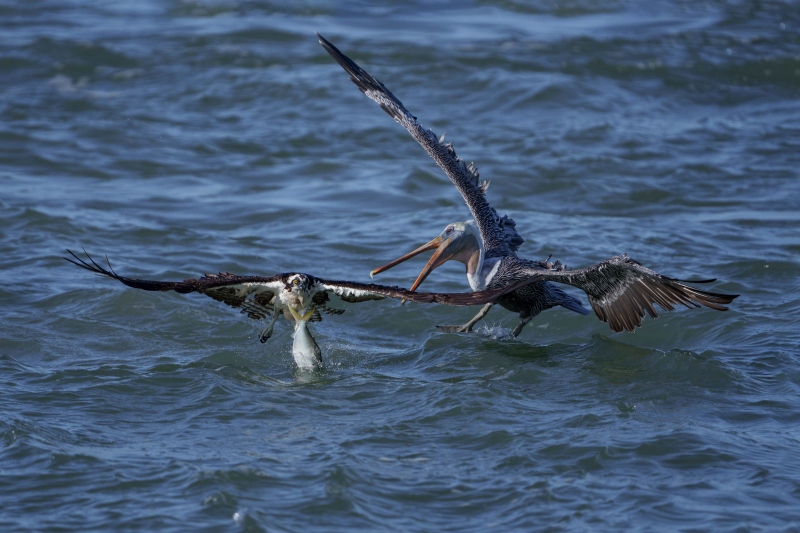
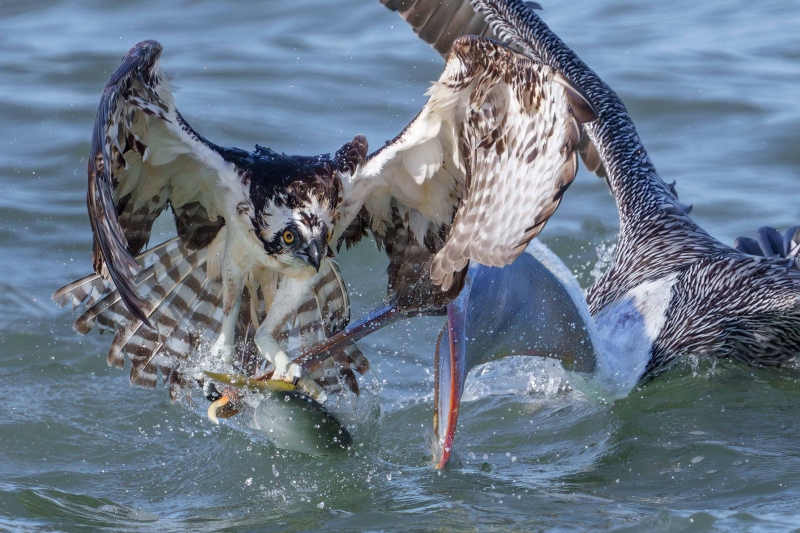
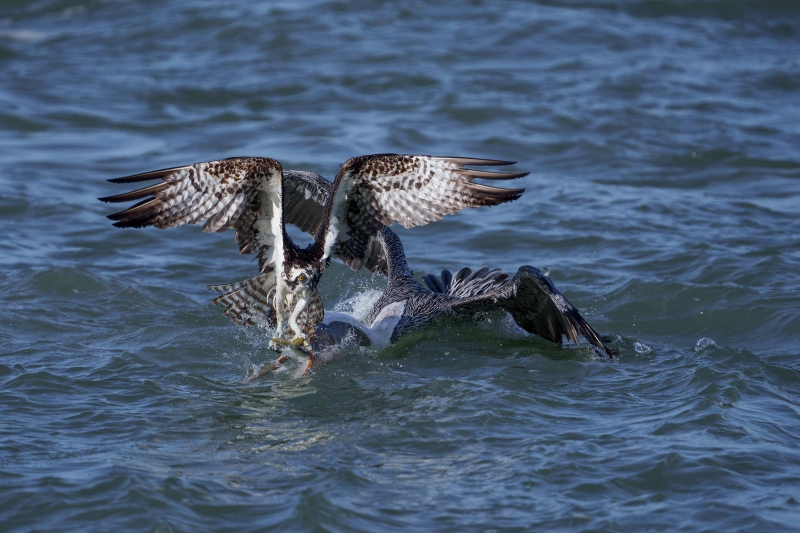
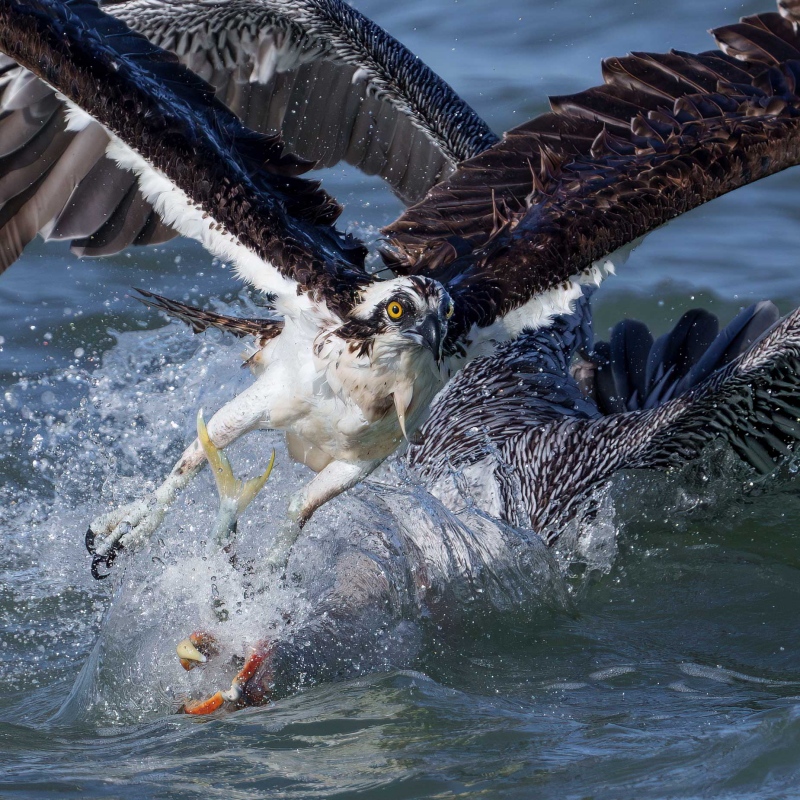
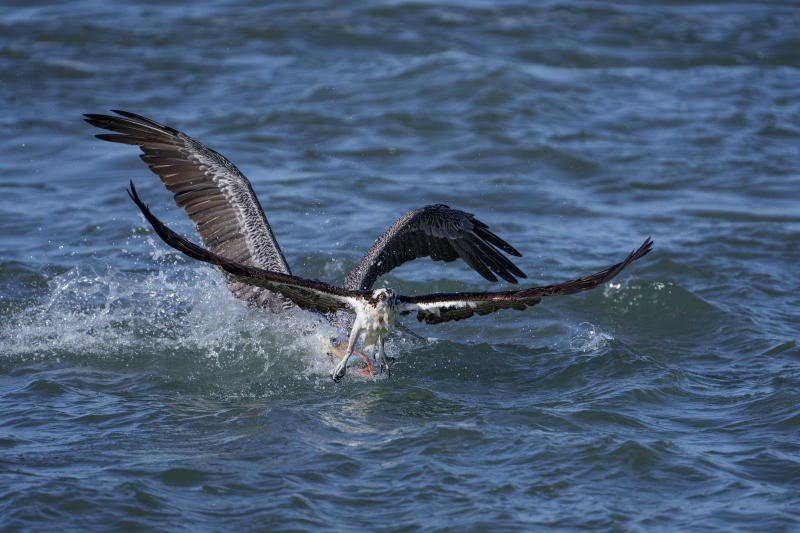
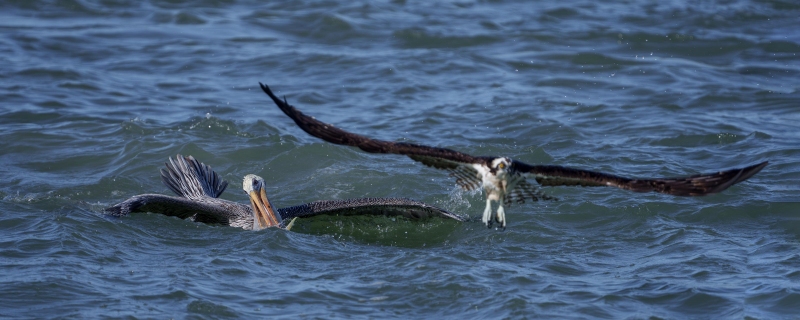






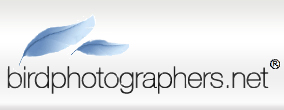


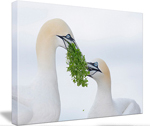



Artie
I want to thank all with the amazing comments!! 🙂
When it comes down to life I keep on keeping and do what I can and that is to be happy and explore and love life being able to be out doors and do what I love, photography is amazing and one needs to keep on trying and some luck. Today I was able to get a Dolphin throwing a snook in air that was so cool, knowing what to do is key that is where my great friend Artie has been amazing in helping me along in my journey with his amazing teachings on photography. I have been thru lots and life is just beginning as I say. PS….I’m single….lol 🙂
“May the Sunshine keep you smiling and the wind set you free”
Always with love Bob
Very, very cool sequence. Thanks for sharing. Hope the Osprey caught an even tastier fish on his next run.
Great Bob! #7 is my favorite for its dynamic action and the fact you can see the pelican preparing to clamp down on the fish.
Non-stop action! I love the “moment of truth” image.
Great series, Bob Eastman! The osprey vs pelican shots are amazing!
Those are some unbelievable shots. Kudos Mr. Eastman.
Wow super series!